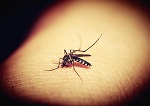
One thing that everyone can agree on is that mosquitoes are annoying. Nothing spoils a nice day outdoors quite like the incessant buzzing and biting that mosquitoes bring. And that's not all there is to these nasty hordes. Mosquitoes are vectors for some of the world's most feared infections. We are talking viruses that cause yellow fever, dengue and Zika. And many other types of pathogenic or disease-causing microbes like malaria can be transmitted by mosquitos.
Much research has been done on how mosquitoes target individuals. They are attracted to certain colors of clothing, the carbon dioxide that we exhale, certain blood types (if your blood type is O, watch out!) and certain scents. Recent research now shows that animals infected with the Zika virus or dengue virus become more attractive to mosquitoes. The virus changes the host to enhance the chances it is the target of a blood meal and transmitted to the next animal. Sinister, don't you think? No wonder about half the world's population is at risk for dengue fever.
Recently, researchers in China have shown that given the opportunity to bite either uninfected mice or mice infected with dengue virus, mosquitoes chose the infected mice almost 70% of the time. The scientists studied what made the infected mice different, and they guessed that it was something about how the mice smelled. They studied hundreds of volatile chemicals involved in scent and finally identified a chemical called acetophenone. They discovered that infected mice had ten times the amount of this volatile chemical than uninfected mice.
The scientists wanted to know if this phenomenon was just in mice, or if it applied to humans too. In experiments where acetophenone was placed on a person's hands, they became more attractive to mosquitos than someone without the acetophenone on their hands. The next step was to see if humans infected with dengue also produced higher levels of acetophenone. Scientists did not want to put everyone in a room to get bitten by mosquitoes, so they collected odors from the subjects instead. They collected odors from the armpits of patients both with and without dengue infections and placed the scent molecules on absorbent paper. The scents from infected patients attracted more mosquitoes.
The scientists ultimately discovered that when a person becomes infected, a protein on the skin that normally limits acetophenone production stops working. In an infected person, high levels of acetophenone are produced, increasing their attractiveness to mosquitos.
The good news is that scientists have shown that a chemical related to vitamin A called isotretinoin restores the skin protein and reduces acetophenone levels. This would make a person infected with dengue virus less attractive to mosquitos. Isotretinoin is already FDA approved for the treatment of acne. This would quicken FDA approval for the required clinical trials in humans.
This could help us reduce the transmission of these deadly viruses, and maybe another way to prevent mosquito bites. Think of the impact that this would have on reducing human misery and illness around the world.
More Information
Infection with Zika or dengue viruses affects the microbiome of the skin, ramping up production of compounds that entice mosquitoes. But treatment with a common acne medication may cancel out this effect...